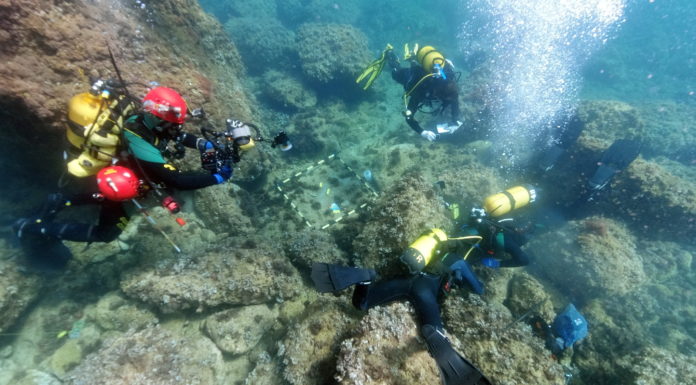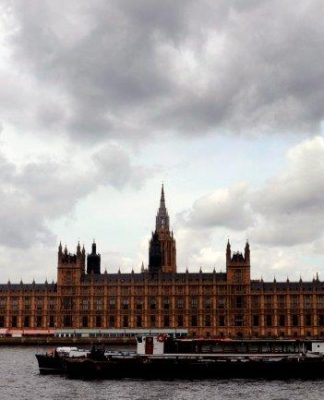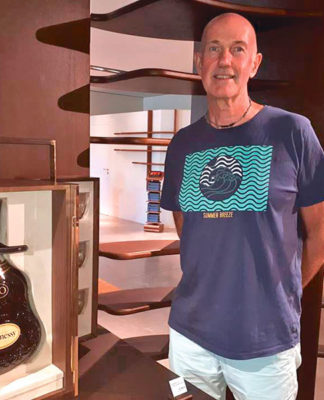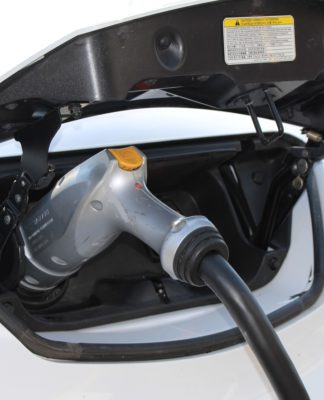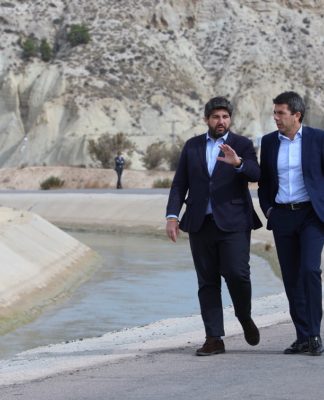January 26
Monte Pego
Dear Sirs,
I have read and digested the epistle in CBNEWS of 25-31 January 2019 from David R Burrage. As a result, I have one or two questions to the informative and erudite, self-appointed scholar of European Union history :-
1) When did the EEC morph into the Federal EU?
2) Why are there two venues for the EU parliament?
3) How much in disruption and cost do these two venues cost?
4) By whom are the extortionate costs and subsistence of MEP’s approved?
Regards,
Roy H Penfold
PS. Who are the ‘British Expats Association’? I have never heard of them in my many years of living in Spain and why are they ‘former’.
We forwarded your letter to Mr Burrage, who in turn has replied as follows:
Thank you for inviting me to respond to the letter from Roy Penfold, concerning the letter published under my name in your 21-25/01/2019 edition.
May I say at this time that, other than where the editor of this newspaper already knows that he can rely on my fullest support at his discretion that, as much as I would wish, I cannot possibly respond to every letter published in any of the local newspapers, other than where I, or indeed, the Editor, identify that there is a wider need, especially when there are those, such as the current writer, who would rather choose to attempt to discredit me, even though he is constrained by the fact that I always put the law in place when advising others. Instead, he chooses to deviate from the factual message I had delivered. I believe this is with the clear intent to attempt to draw me into the Brexit argument, even though I had made it clear that I have no wish to become so embroiled.
When writing my earlier response I had merely sought to bring accurate information to the attention of expats concerning those matters, where we already know, will affect them and or their families come Brexit, deal or no deal. Further, when doing so I also took and still take into account, the fact that it is not only residents who read this newspaper, although it was mainly in the light of the much misinformation currently being distributed by both the leave and the remain camps which prompted me to do so. I also referred to the fact that many aspects of Brexit, which may affect expats, have yet to be decided.
The distribution of misinformation has mostly been due to the fact that many of those who have contributed to this page had/have little understanding of, not only existing EU law, but also more recently adopted law, including the new requirement for all non-EU citizens to seek prior consent before attempting to enter, not only the external borders of the EU, but also each of the countries through which they seek to pass as well as the country of their destination. This is because of the new ‘European Travel Information and Authorisation System (ETIAS), albeit this could possibly take just over 2 years before the new system is up and running, because such measures also entail the setting up frontier posts throughout the EU and this measure is already in action.
Further, I did so because it was also clear that certain writers appeared not to be aware of both existing arrangements and possible new arrangements concerning such matters as the issue and validity of British passports or indeed, the incoming new ‘blue’ passport, as well as other matters such as drivers’ licences with the possible requirement for the holder to possess an international driving permit (IDP) in addition and not in replacement of their current driver’s licence. It should be remembered that the currently issued UK/EU model licences are regulated by EU law and that will no longer apply, other than by way of some future agreement.
My earlier response was also prompted by the fact that at least one writer had taken to being grossly rude and verbally aggressive in his response to an earlier writer. There can be no room for that kind of conduct in this extremely vexatious matter or indeed, any other matters.
I will also add that I had deliberately refrained from going into all of the ramifications of the new ETIAS and there are many, simply because I consider that this is a matter to be aired closer to its implementation.
The opening paragraph of Mr.Penfold’s letter, when specifically referring to me, amounts to a contradiction in terms, since having first referred to me as being ‘erudite’ (knowledgeable), he then goes on to refer to me as a being a ‘self-appointed scholar of European Union history’… Whereas had he read my response properly he would have seen that I made absolutely no reference to the history of the European Union, let alone declaring myself to be a scholar, even though I have studied this and other histories.
It is also quite apparent to me from the way in which his letter is couched that, since he could find no way to quarrel with that which I had previously set out, the real purpose of Mr.Penfold’s letter was solely to draw me into an argument, when attempting to support his own views, on whether the UK should leave or remain in the EU, even though I had clearly stated that that was not the purpose of my intervention. I would say to Mr.Penfold and other likeminded people that I am too long in the tooth to allow others to pull my strings, even though I may have my own views in this matter
In his letter Mr. Penfold poses 4 questions and whilst I would not normally respond, I do so briefly as a one off in order that he cannot use me when attempting to enforce his own arguments.
Before dealing with those 4 questions Mr. Penfold raises, I should first like to deal with his ‘Post Script’, wherein he sets out that, his, ‘Having been in Spain for many years he had never heard of the British Expats Association (Spain)’. And further, where he asks as to why it is referred to as a former association.
Firstly, his P.S. serves to identify my reasons for emphasising that expats should keep themselves up-to-date in respect of the impact Brexit may have on their lives by inviting them to keep abreast of the news media, the UK’s information website and where they have the opportunity to attend one of the Consular ‘Outreach’ meetings, which are always announced in the CBN.
For Mr. Penfold’s benefit, in early 2000, together with Peter Woodall, I co-founded the Association to which he refers. We came together following my many regular letters published in this, and other newspapers, concerning all those wide ranging matters affecting the rights of expats, including their obligations to their host state when moving or residing within the EU. Our association was born of need, which was in order to take out of the equation the many barrack lawyers, who abounded here at that time and still do.
Unfortunately neither of us envisaged the enormous growth of the Association which had reached a membership of over 30,000, including having one member as far away as the PR of China. Whilst our membership included mainly British nationals, anyone, whatever their nationality was welcome to join us and many did so.
It is difficult to put an exact date on when we really closed down, because although we first announced our closure in 2011, we continued our activity until September 2017 when we finally took down our website. This included securing the winter fuel payment for all qualifying expats in more recent years, and even despite Ian Duncan Smith’s introduction of his very dubious temperature criteria we continued with our fight. I should add that when first announcing our intended closure, we gave an undertaking to continue with all outstanding matters. Even today I am still engaged in advising one of our former members concerning a judicial appeal.
The main reasons for our closure were:
(a) Because even though we were always hopeful that others would step up to the plate and take over that which we had started, sadly, of those expats who did offer their help, they did not have the necessary knowledge of law.
(b) My colleague Peter and I found ourselves working 24/7 and, mostly into the small hours, when not only advising our members, we also guided them in the preparation of their judicial appeals, including taking over a number of appeals in respect of those who were clearly unable to do so themselves.
(c) Also where my colleague and I had been funding the Association from our own pockets. This included hosting and purchasing software for our website, cost of stationery, postal expenses, as we only used recorded service, during this period I also strangled 3 computers to death, such was the volume of our work. Also I had travelled to London at my own expense on 3 occasions. Twice for meetings with MPs at Westminster, and a meeting with the International Office of one of the main Parties. This is not to mention where I had attended many other meetings locally.
The final crunch came when we suggested a small contribution from our members, which amounted to no more than the cost of a packet of cigarettes a year. For obvious reasons this would also have meant additional expense in the employment of an outside accountant. Regrettably, we only received a 7% positive response from our membership, including where a number of our members rathered choosing to withdraw their membership than to pay such a small annual contribution. At that time I advised our members, when borrowing those words from Benjamin Franklin, ‘They will know the worth of water when the well runs dry’.
With regard to the answers to the four questions posed by Mr. Penfold, such questions would normally surprise me, simply because most of the information he seeks can readily be found on the Internet. And in any event I suspect he knows most of the answers he seeks. Nevertheless, I will answer his questions solely so as to avoid him the opportunity of involving me in his own argument. I will deal with the order in which he raises his questions.
1. He asks when did the EEC ‘morph’ into the Federal EU. Firstly, the EU is not a federal body and due to the many divergent cultures of the Member States, I doubt that it is likely to become a reality in the immediate future, even though I am aware of the fact that Germany and France wish to see further political integration and most recently have signed up to such an accord.
The current EU has been an ever evolving institution since the idea was first promulgated by Sir. Winston Churchill as early as November 1942,when writing to the British War Cabinet, “Hard as it is now to say, I trust that the European family may act unitedly as one under a Council of Europe. I look forward to a United States of Europe.” And whilst he acknowledged that some political union was inevitable, since it would also require common legislation, it becomes clear when delving into his later involvement in the European movement that he had never been suggesting the creation of one big Super State.
From 1945 onwards there were also many other prominent proponents of a united Europe, including President Roosevelt. Indeed, the European Movement was initially mainly financed by the USA through the OSS (Now CIA) and laundered by the then, Belgium PM owing to the restrictions on the flow of money at that time.
What we now call the EU came into being with the aim of ending the frequent and bloody wars between neighbours, which culminated in the Second World War and in order to unite European countries economically and politically in order to secure lasting peace and establish economic stability in Europe.
The European Communities (EC), sometimes referred to as the European Community was comprised of three international organizations which were governed by the same set of institutions. These were the European Coal and Steel Community (ECSC), the European Atomic Energy Community (EAEC or Euratom), and the European Economic Community (EEC); the last of which was renamed the European Community (EC) in 1993 by the Maastricht Treaty, which then formed the in 1993, they became its first pillar. The European Coal and Steel Community ceased to exist in 2002 when its founding treaty expired. The European Community was dissolved into the European Union by the Treaty of Lisbon in 2009; with the EU becoming the legal successor to the Community. Euratom remained an entity distinct from the EU, but is governed by the same institutions. European Union. Further, when the Communities were incorporated into the European Union.
2. By his 2nd question Mr. Penfold asks as to why the EU Parliament meets at 2 separate locations. This is because of EU’s long history when first involving the European Coal and Steel Community and when the members could not agree where its institutions should be based, so they agreed on Luxembourg as a temporary compromise. The problem however was that the institutions included a parliamentary assembly and there simply was no building in Luxembourg to accommodate the assembly. Therefore the parties decided that the assembly should use the already existing building for the Council of Europe in nearby Strasbourg, thereby moving the initial seat of the parliament to Strasbourg. Ironically this was also done out of frugality. Meanwhile the CJEU, as we know it today, still has its seat in Luxembourg. However, because of the interaction between the Commission, the Council and the Parliament, out of necessity, they require some physical proximity, this is why the Parliament acquired another seat in Brussels and probably because of, not only the cost of building an even greater building in Brussels, I can only assume that there is only so much space available there. For this reason the meetings of the whole Parliament (“plenary sessions”) take place in both Strasbourg and in Brussels. This currently means that MEPs now have to travel back and forth between the two locations. Indeed, even our own Parliament has more than one debating Chamber, Westminster Hall for example, albeit they are in one building.
Further, and as a matter of interest the European Parliament has three places of work, because the administrative offices (the ‘General Secretariat’) is located in Luxembourg.
It is commonly agreed that having three separate locations for the above institutions is most unfortunate. The problem also arises because of the economic interests of the main stake holders, France, Belgium and Luxembourg and that the current (TFEU) and former treaties requires a unanimous decision by all of the Member States as to where its institutions are to be located. It was for this and other reasons, that I stated in my earlier letter that the EU is not perfect and that there is a need for change. However, in respect of this particular matter, we also have to consider the enormous cost, not to mention the disruption, involved in housing all of the institutions in one location. This matter must also be viewed against the backdrop of the ever evolving Union.
3. By his 3rd question, he asks about the disruption resulting from two separate seats of Parliament and the cost involved. As I have already answered most of this question above, I can tell him that the Parliament sits in Strasbourg for one week each month and the actual cost involved is put at €114 million, although I doubt we will ever know the true financial cost. Although I am aware that his question is politically motivated, I doubt that anyone can put a true cost involved in the functioning of the EU, since there are so many institutions falling within its remit. Therefore, when considering the reasons which finally led to the EU, as it is today, I will answer Mr. Penfold by informing him that the actual annual contribution to the EU by the UK for the year 2017 has been put at almost £9 billion. That is unless you drive a red bus. I can also tell him that the UK’s financial cost alone, as a result of WWII, was put at a staggering £965,099 billion set at 2005 figures. Not to mention the huge cost to life and limb as well as the many other deprivations.
4. By his question he asks who is responsible for the approving the pay and expenses of MEPs. A simple answer is the Parliament itself and whilst we know their annual salary is €101,808 as at 2016, the expenses they incur are kept secret. In respect of the latter I would be amongst the first to say that it is most unsatisfactory, or indeed scandalous that there is a total lack of transparency, which regrettably, has been upheld by the CJEU on the spurious basis that it would infringe MEPs right to privacy.
Regards,
David R.Burrage.
























